Mastering the Complex Sale: How to Compete and Win When the Stakes are High!
£17.20£19.90 (-14%)
“Jeff Thull’s process plays a key role in helping companies and their customers cross the chasm with disruptive innovations and succeed with game-changing initiatives.”
―Geoffrey A. Moore, author of Crossing the Chasm and Dealing with Darwin
“This is the first book that lays out a solid method for selling cross-company, cross-border, even cross-culturally where you have multiple decision makers with multiple agendas. This is far more than a ‘selling process’―it is a survival guide―a truly outstanding approach to bringing all the pieces of the puzzle together.”
―Ed Daniels, EVP, Shell Global Solutions Downstream, President, CRI/Criterion, Inc.
“Mastering the Complex Sale brilliantly sets up value from the customer’s perspective. A must-read for all those who are managing multinational business teams in a complex and highly competitive environment.”
―Samik Mukherjee, Vice President, Onshore Business, Technip
“Customers need to know the value they will receive and how they will receive it. Thull’s insights into the complex sale and how to clarify and quantify this value are remarkable―Mastering the Complex Sale will be required reading for years to come!”
―Lee Tschanz, Vice President, North American Sales, Rockwell Automation
“Jeff Thull is winning the war against commoditization. In his world, value trumps price and commoditization isn’t a given, it’s a choice. This is a proven alternative to the price-driven sale. We’ve spoken to his clients. This stuff really works, folks.”
―Dave Stein, CEO and Founder, ES Research Group, Inc.
“Our business depends on delivering breakthrough thinking to our executive clients. Jeff Thull has significantly redefined sales and marketing strategies that clearly connect to our global audience. Read it, act on it, and take your results to exceptional levels.”
―Sven Kroneberg, President, Seminarium Internacional
“Jeff’s main thesis―that professional customer guidance is the key to success―rings true in every global market today. Mastering the Complex Sale is the essential read for any organization looking to transform their business for long-term, value-driven growth.”
―Jon T. Lindekugel, President, 3M Health Information Systems, Inc.
“Jeff Thull has re-engineered the conventional sales process to create predictable and profitable growth in today’s competitive marketplace. It’s no longer about selling; it’s about guiding quality decisions and creating collaborative value. This is one of those rare books that will make a difference.”
―Carol Pudnos, Executive director, Healthcare Industry, Dow Corning Corporation
Read more
Additional information
| Publisher | 2nd edition (30 Mar. 2010), Wiley |
|---|---|
| Language | English |
| Hardcover | 304 pages |
| ISBN-10 | 9780470533116 |
| ISBN-13 | 978-0470533116 |
| Dimensions | 16 x 3.05 x 23.11 cm |

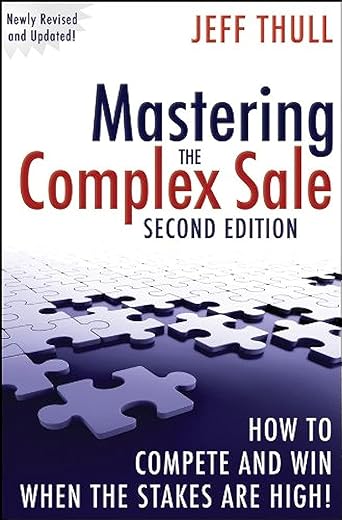
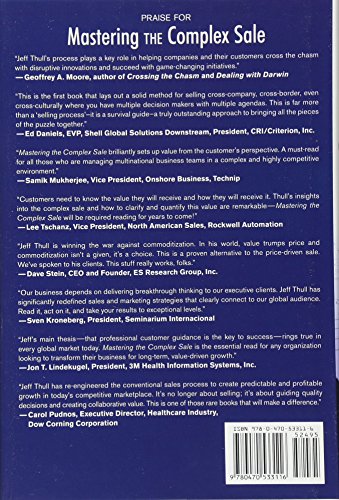
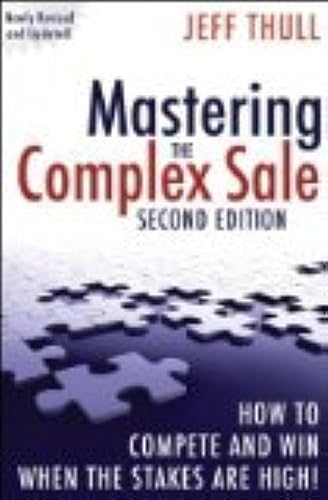

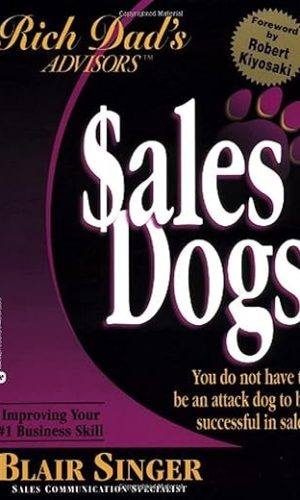


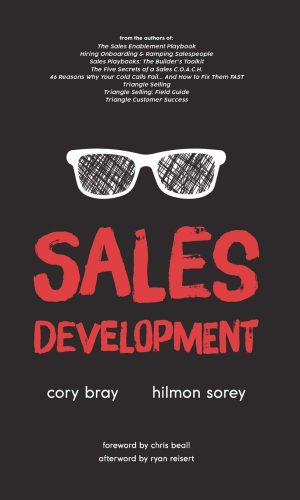

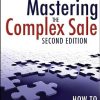
by REDSOX RESEARCH
Helpful, direct and different!
by AGS
Very insightful, a refreshing modern approach.
by Pen Name
Lots of valuable advice. Rather waffly though. Could have been edited down to half the size.
by Paul Smart
The bible of complex selling.
You may take years to read this but you can keep going back to it and learning more.
It is excellent
by Robert Morris
Note: The review below is of the first edition that Jeff Thull has since revised and updated in this second edition. In fact, the phrase “revised and updated” really should be “extensively revised and updated” because there is so much new material in this book (check out Chapters 8 and 9 in Part III) and the scope and depth of his brilliant Diagnostic Business Development (DBD) process is increased as he explains how it enables those who use it to get beyond selling to managing decisions in collaboration with the buyer; get beyond problem solving to facilitating beneficial change; get beyond meeting customers’ immediate needs to managing their near-, mid-, and long-term expectations; get beyond single transactions to managing multi-dimensional relationships; and finally, to get beyond rote talking points and “value messages” to rich, rigorous, and interactive conversations.
The second edition reflects the positive and significant influence of two books Thull published after the first edition, The Prime Solution and Exceptional Selling. He refines several of their core concepts in the second edition that also reflects substantial feedback that enlightens and strengthens the DBD process. In these and other ways, the second edition is more, much more than a sequel. As I read Thull’s Introduction, I was reminded of Ken Robinson’s explanation of the reasons for the second edition of Out of Our Minds: “…the first reason is that so much has happened since since [2000], both in [begin italics] the [end italics] world and in [begin italics] my [end italics] world…The second reason for this new edition is that I now have more to say about many of the core ideas in the book and what we should do to put them into practice…The third reason is, not only has the world moved on in the last ten years, I have too. Literally.” The same is true of Jeff Thull as well as of those such as I who found so much of value in the first edition and so much more in the second.
* * *
Complex sales are those which involve a lengthy process of cultivation and solicitation, a “circle of influence” within which the purchase or pass decision is made, a product or service whose functions/features/benefits/ etc. require technical verification, and a substantial purchase price. In this volume, Thull focuses on the process by which to “compete and win when the stakes are high.” To understand how to master the complex sale, one must first understand how and why the role of the salesperson changed throughout the last half of the 20th century. Thull respectfully but clinically explains the inadequacies today of sales strategies, processes, and skills which were effective from the early-1950s until about the early-mid 90s. How well I recall the advice I received from various sales managers when I earned my way through college by selling automobiles and smaller trucks in the Chicago area during summer vacations. Never take “no” for an answer, for example. “Selling begins when the prospect says ‘no.'” Another chestnut was flattery: “You look great behind the wheel! This car was built for you!” Times change, of course. One paradigm inevitably gives way to another. I agree with Thull that, today, “It’s not about selling — it’s about managing [a prospect’s] quality decisions.” Actually, I view that approach as the purest form of selling: to serve as advisor, concierge, consigliere, consultant, etc. when collaborating with a pre-qualified prospect to make the most appropriate purchase decision.
Thull carefully organizes his material within ten chapters which range from the first, “The World in Which We Sell” (almost worth the price of the book all by itself) to the last, “A Complex Sales Future,” in which Thull agrees with Jack Welch that we must either control our destiny or someone else will. Given what I now do to earn a living, Chapter 6 (“Designing the Complex Solution”) was of special interest to me. In it, Thull suggests that “Prime professionals approach [Thull’s] solution design phase of the complex sale as an exploratory process. The aim is to equip the customer to make the best, most effective choice among the solutions competing in the marketplace.” By taking precisely the same approach, the IBM sales force was able to recapture most of the customers it had lost while improving its chances when cultivating and then soliciting prospective new customers.
As Thull explains, the process built during the Diagnosis, a precise agreement on what a customer is experiencing in the absence of the needed solution and it’s financial impact, with a collaborative discussion that determines precisely what a customer’s desired outcomes are. “The easiest way to begin to define the parameters is to ask customers how they expect their situation to look after the problem is solved.” For me, Thull then makes an especially important point when alerting his reader to the “trap” of unpaid consulting which begins “when we cross the line between defining parameters of a solution and creation of the design of the solution itself.” Please consult the book for Thull’s complete explanation of each phase of The Prime Process.
Given the importance of winning in sales, especially “when the stakes are high,” it would obviously be a mistake to assume that Thull (or anyone else) has all the right answers or is even addressing all of the right questions. My strong recommendation is that each reader rigorously evaluate available sources of relevant information and counsel (including this book), using the same process Thull proposes: Discover what those sources are, Diagnose their relative advantages and disadvantages, Design (or Re-Design) a sales program which is most appropriate to one’s specific needs and objectives, and then finally, Deliver satisfactory results through effective implementation of that program.
It would also be a mistake to assume that the relevance of the strategies and tactics which Thull endorses is limited, literally, to the buying or selling of a product or service. Many complex “sales” can also involve effective persuasion to obtain funds from financial sources, for example, or to convince the best-qualified CEO candidate to accept the position offered. If used effectively in situations such as these, the same strategies and tactics can also be invaluable.
In today’s increasingly more competitive marketplace, Thull observes, “There is no Magic! — Spectacular success is always preceded by unspectacular preparation” as well as by a better system, sharper skills, and “above all” discipline. The Prime Process is not for every organization, nor does Thull make such a claim. Carefully consider what it involves and, especially, what it requires.
I presume to add a final observation of my own, that there is both “good news” and “bad news.” First the bad news: Very few organizations have as yet mastered the complex sale process. Now the good news: Very few organizations have as yet mastered the complex sale process.
by Rolf Dobelli
This excellent guide explains a methodology that can help anyone in sales. This sales approach depends essentially on seeing the sale through the customer’s eyes, and involving the customer in designing a solution to his or her own problems. This approach goes against some standard practices in sales, but those standard practices antagonize customers and build distrust. Author Jeff Thull offers helpful reminders on the value of researching individual customers, picking the right entry point to an organization and other best practices. However, he sometimes seems over-enthusiastic and over-optimistic about his system’s infallibility. After all, in some organizations, sales people who tried to follow this methodology would be criticized for failing to meet more conventional targets, such as number of calls per week. This detailed method for conquering many-level, multi-step sales is time and research-intensive, but highly effective. We applaud his emphasis on the value of asking and listening instead of speaking. Highly recommended.
by Niall Norton
This is an excellent book and sales process. Highly recommended